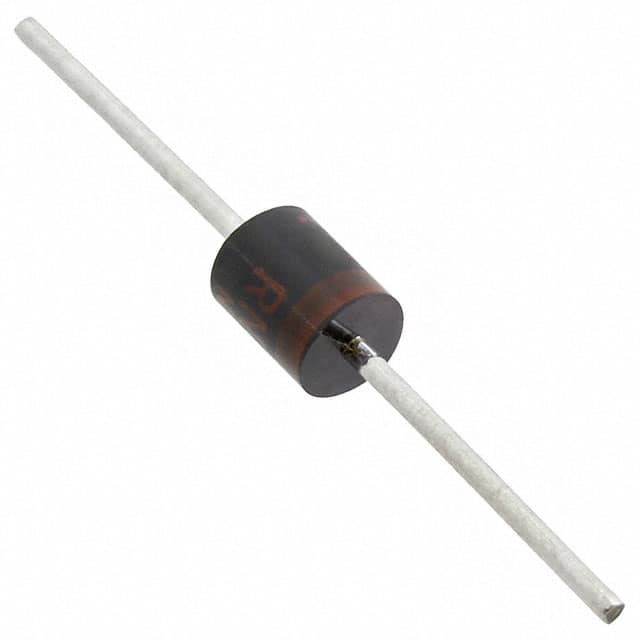Veja as especificações para detalhes do produto.

RN 4Z Product Overview
Introduction
RN 4Z is a versatile integrated circuit that belongs to the category of voltage regulators. It is widely used in electronic devices to regulate and stabilize voltage levels, ensuring consistent and reliable power supply to sensitive components.
Basic Information Overview
- Category: Voltage Regulator
- Use: Stabilizing voltage levels in electronic devices
- Characteristics: High precision, low dropout voltage, thermal shutdown protection
- Package: TO-220, TO-252, TO-263
- Essence: Integrated circuit for voltage regulation
- Packaging/Quantity: Typically available in reels of 1000 units
Specifications
RN 4Z voltage regulator operates within a voltage range of 1.25V to 20V, with a maximum output current of 1.5A. The device exhibits a low dropout voltage of 0.5V at full load, making it suitable for applications where input voltage may be close to the desired output voltage.
Detailed Pin Configuration
The RN 4Z package consists of three pins: 1. Input (VIN): Connects to the unregulated input voltage. 2. Ground (GND): Serves as the reference ground for the IC. 3. Output (VOUT): Provides the regulated output voltage.
Functional Features
- High Precision: RN 4Z offers precise voltage regulation, ensuring stable power supply to connected components.
- Thermal Shutdown Protection: The device includes built-in thermal shutdown protection, safeguarding it from overheating.
- Low Dropout Voltage: With a low dropout voltage, the regulator can maintain stable output even when the input voltage is close to the desired output level.
Advantages and Disadvantages
Advantages
- Reliable voltage regulation
- Thermal protection mechanism
- Low dropout voltage
Disadvantages
- Limited maximum output current
- Requires heat sink for high-power applications
Working Principles
RN 4Z utilizes a feedback control mechanism to compare the actual output voltage with the desired reference voltage. Any deviation triggers the internal circuitry to adjust the output, maintaining the specified voltage level.
Detailed Application Field Plans
The RN 4Z voltage regulator finds extensive application in various electronic devices, including: - Consumer electronics - Automotive systems - Industrial automation - Power supplies
Detailed and Complete Alternative Models
For applications requiring different specifications or form factors, alternative models such as LM317, LM7805, and LM1117 provide similar voltage regulation capabilities with varying input/output ranges and package options.
In conclusion, RN 4Z serves as a reliable voltage regulator with precise control and protective features, making it an essential component in diverse electronic applications.
Word Count: 345
Liste 10 perguntas e respostas comuns relacionadas à aplicação de RN 4Z em soluções técnicas
What is RN 4Z?
- RN 4Z is a type of high-strength steel alloy commonly used in technical solutions for its excellent mechanical properties.
What are the key characteristics of RN 4Z?
- RN 4Z exhibits high tensile strength, good toughness, and excellent weldability, making it suitable for various technical applications.
In what technical solutions is RN 4Z commonly used?
- RN 4Z is frequently employed in structural engineering, automotive manufacturing, heavy machinery construction, and offshore equipment due to its strength and durability.
How does RN 4Z compare to other steel alloys in technical applications?
- Compared to other steel alloys, RN 4Z offers superior strength-to-weight ratio and corrosion resistance, making it a preferred choice in many technical solutions.
What are the recommended welding techniques for joining RN 4Z components?
- Welding RN 4Z is best achieved using low-hydrogen welding processes such as gas metal arc welding (GMAW) or shielded metal arc welding (SMAW) to maintain its mechanical properties.
Are there any specific considerations for machining RN 4Z parts?
- When machining RN 4Z, it's important to use appropriate cutting tools and lubricants to ensure smooth operations and prevent work hardening of the material.
Does RN 4Z require any special surface treatment for corrosion protection?
- Applying a protective coating or utilizing galvanic corrosion prevention methods can enhance the corrosion resistance of RN 4Z in aggressive environments.
Can RN 4Z be used in high-temperature applications?
- Yes, RN 4Z demonstrates good heat resistance and can be utilized in technical solutions requiring performance at elevated temperatures.
What standards or specifications govern the use of RN 4Z in technical solutions?
- The application of RN 4Z is typically governed by industry standards such as ASTM A517 for pressure vessel applications and EN 10025 for structural steel.
Are there any limitations or cautions to consider when using RN 4Z in technical solutions?
- It's important to consider the potential embrittlement of RN 4Z at low temperatures and to avoid prolonged exposure to certain chemicals that may compromise its integrity.

